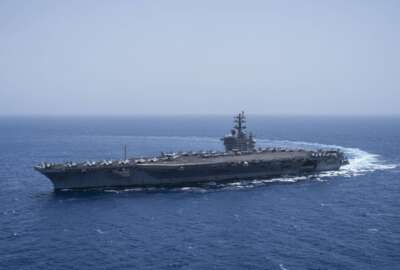How the military gets motivation right
In her 26-years of government service, Robin Wink served in both the military and the civil service. Wink says there\'s a lot civilian agencies can learn about...
wfedstaff | June 4, 2015 5:31 pm
By Robin Wink, owner, Rudman Wink Associates
I was recently asked by Federal News Radio what federal managers could learn from the military about keeping employees motivated. Having served both on active duty and in the civil service, that got me thinking: What does the military do that keeps people motivated in difficult times?
The military operates in a leadership-centric way that is not present in the civil service. What do I mean by leadership centric? From day one, whether you are a newly commissioned officer or a young enlisted troop, you are focused on leadership. This constant emphasis includes formal training, unit ceremonies, and day-to-day activities. 
Formal Training
In all branches of the military there are formal training programs. As an officer, even before you are commissioned, you are drilled in leadership.
Whether you attend a four-year service academy, as I did, participate in college ROTC, or are commissioned through Officer Training School, preparation involves a study of leadership and supervisory skills. A series of leadership schools follow — one for young officers, an intermediate course for mid-career folks, and an executive level course for senior leaders.
Professional military training is also part of the enlisted career; leadership training begins early and continues throughout. In the Air Force, for example, an airman with approximately three to five years of military service attends a three-month leadership school (10 semester hours are awarded) to prepare for his first supervisory position.
The contrast with the civil service is stark. Only 64 percent of new federal supervisors receive some sort of formal supervisory training, and most of those only receive a one to two week crash course. In 2010 the Merit Systems Protection Board completed a study on supervisory issues and concluded: “…agencies often give too little weight to supervisory skill or potential when filling first-level supervisory positions, and too little attention to supervisory training, development and feedback afterward. The common consequence is suboptimal first-level supervision.” This suboptimal supervision does not engender high levels of motivation.
Unit ceremonies
Military units tend to have more unit-level activities where esprit de corps is cultivated. Formal change-of-command ceremonies are but one example. These ceremonies serve a vital motivational role for everyone in the unit. They are a time to reflect on the accomplishments during the outgoing commander’s reign as well as an opportunity to meet the new commander and learn of her leadership philosophy and unit aspirations. This ceremony provides stability and clear lines of authority. This keeps everyone motivated and engaged in a common purpose.
Even less formal and more frequent unit activities — such as PT (physical training) — are an excellent opportunity for building camaraderie, support and motivation.
In the civil service, we don’t have as many similar opportunities. There are no formal “change-of-command” ceremonies. Oftentimes, the outgoing supervisor is long gone before a new supervisor is identified. Instead of motivating employees, this change brings uncertainty. Senior civil service leaders need to be conscious of the effects of change and spend extra effort to stabilize the environment for employees during a transition period.
Moreover, supervisors and managers should look for informal group events to keep people engaged and motivated. Though you may not be able to order your “troops” out for a five-mile run, maybe a friendly challenge match on the softball field or in the bowling alley can generate a similar spirit.
Day-to-day emphasis on leadership
During my time in the military, there was a constant buzz and awareness of the need for good leadership. Rarely did I attend a staff meeting or a commander’s call or some other official meeting where leadership was not on the agenda.
Civil service leaders from the top down can learn from this. Make leadership or motivation a topic at your next staff meeting. Have you read any good leadership books lately? Pass them on to your staff. Or better yet, institute a leadership “book club” over lunch or at a quarterly staff meeting to discuss the latest. My recent favorites include Dan Pink’s “Drive: The Surprising Truth About What Motivates Us,” and “Strengths Based Leadership: Great Leaders, Teams, and Why People Follow,” by Tom Rath and Barry Conchie.
Finally, in the military, high expectations abound. Military forces, following their leaders, are constantly tackling tough assignments with zeal.
There is much we can learn from this in the civil service. In difficult times, the best supervisors acknowledge their team’s demanding tasks and inspire employees to rise to the occasion.
Don’t be afraid to challenge your employees. High expectations are contagious, motivating and, ultimately, self-fulfilling.
Robin Wink is the owner of Rudman Wink Associates, a training company for federal employees. She is a former federal employee with 26 years of service in the U.S. Air Force and multiple civilian agencies. She wrote this column as part of Federal News Radio’s “Managing Morale” special report.
Copyright © 2024 Federal News Network. All rights reserved. This website is not intended for users located within the European Economic Area.





